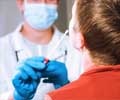When patients undergo any type of surgery after having had COVID-19, their odds of significant postoperative problems diminish with elapsed time from COVID-19 diagnosis.

COVID-19: Perioperative Risk Assessment
The team analyzed composite odds of various cardiovascular problems within 30 days following surgery: deep venous thrombosis, pulmonary embolism, cerebrovascular accident, myocardial injury, acute kidney injury, and death.‘The incidence of the 30-day composite outcome dropped steeply at first, from approximately 18% to 10% over the first 100 days after COVID-19 diagnosis.’





It then proceeded to dwindle steadily for the next 10 months, reaching approximately 8% after 400 days from COVID-19 diagnosis. The rate of decreasing risk was unaffected by patients’ COVID-19 vaccination status. “Compared to previous population studies of this issue, ours is distinguished for tracking surgical outcomes more broadly and using a longer time horizon from COVID-19 diagnosis,” said Robert Freundlich, MD, MSCI, associate professor of Anesthesiology and Biomedical Informatics, who led the study with critical care medicine fellow John Bryant, MD.
“As we were midway in our study, based on postoperative pulmonary outcomes one medical society issued a recommendation to delay surgery after COVID-19 by up to 12 weeks in more severe cases of COVID-19,” Freundlich said. “Meanwhile, with respect to this range of cardiovascular problems, in our data we were surprised to find a trend of subsiding risk still discernable more than a year after COVID-19 diagnosis.”
“In a given patient’s case, many considerations can influence when surgery should best occur, and our results provide further indication that doctors and patients would do well to include proximity to COVID-19 in their thinking.”
Source-Eurekalert















